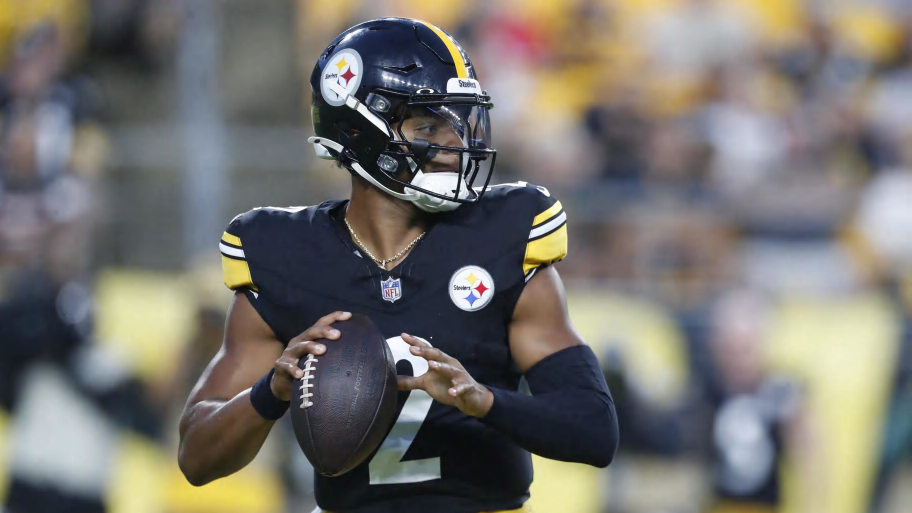
NFL training camps are over, and so is preseason. Cut-down day is Tuesday and the 2024 regular season starts Sept. 5 when the Kansas City Chiefs will host the Baltimore Ravens. Which leaves us with a lot to get to in this week’s takeaways …
My feeling is that Justin Fields has done enough to make this week interesting in Pittsburgh. That doesn’t mean that, when it’s over, Mike Tomlin won’t step to podium and name Russell Wilson the Steelers’ starter. But the fact that we’re still talking about this—Tomlin has left the competition open after the Steelers’ last preseason game—is a very real indication of where Pittsburgh is at with its opener less than two weeks away against the Atlanta Falcons.
Last week, Wilson had an opportunity to seize the job, practicing without restriction for the first time since injuring his calf earlier in the summer. He didn’t.
So now, after both quarterbacks had quick, efficient performances in that preseason finale against the Detroit Lions, the opportunity swings from Wilson to Fields. Can he take the job? I wouldn’t say that’s probable, but I do think it’s possible.
The Steelers have put in a lot of work with Fields. After acquiring him, the offensive staff, led by coordinator Arthur Smith, did a deep dive into Fields’s football career with the Chicago Bears, as well as at Ohio State. They found a quarterback who lost confidence in three years in Chicago. And as they kept digging, they made the decision to take his footwork back to what it was, from a technical standpoint, with the Buckeyes.
It took time to get his footwork back together. But as training camp got going, Fields started to look more comfortable—to the point where more recently he’s looked way more comfortable than he did in spring. On Saturday, in Detroit, that finally showed up in a game setting, giving the staff the feeling that he was regaining the confidence he’d played with as a collegian (and in particular on a beautifully executed seam throw to tight end MyCole Pruitt for 22 yards). The big thing was how calmly and easily he moved.
Now, there was a fumbled snap on his second and final possession, and that’s been a problem. But it’s a problem that can be corrected. And at this point, there’s no question the upside play would be to go with Fields, who’s more than a decade younger (25), as well as bigger and faster than Wilson.
The 36-year-old Wilson does bring experience to the table, but there’s not a ton of evidence that he’ll be markedly different from what he’s been the past three years. One argument for playing him is that if he fails, the Steelers can always turn to Fields, four or six or eight weeks into the season, whereas it’d be much tougher to do the reverse and go back to Wilson after naming Fields the starter.
Fields has also impressed with his football makeup and smarts, even if he still doesn’t see the field as fast as you’d like (which was the problem in Chicago). There’s also a belief that Smith could well do for Fields in Pittsburgh what he did for Ryan Tannehill in Tennessee.
That’s why he has real support in the building. Which should make this week really interesting for the Steelers.
The Tampa Bay Buccaneers don’t get enough respect. And I say this not to troll my podcast partner Conor Orr—who’s had some well-publicized run-ins over his Tampa takes—but to look harder at what they’ve accomplished as they got into Year 2 A.B. (After Brady).
They’ve made the playoffs four consecutive years. They’re the only NFC team that can say that and one of just three across the NFL, joined by the Kansas City Chiefs and Buffalo Bills, in that category. They’ve won the NFC South in three of those four years and won Super Bowl LV in the one they didn’t. And, now, they’ve gotten to the playoffs, and even advanced a round, without Tom Brady on their roster.
They’ve also gone from one of the league’s oldest teams, which was a product of going all in during Brady’s three years as a Buccaneer, to an increasingly young one. They won last year while purging a record amount of dead cap charges (around $80 million) accumulated from aggressive building with Brady as quarterback. And they’ve continued to hit on draft picks.
Consider this: 22 of the 23 picks the Buccaneers have made the past three years (2022 to ’24) remain with the team. I’d bet all 22 of them make the team. Then, throw in their undrafted free agent finds, and I wouldn’t be stunned if more than half of their roster comes from the past three draft classes. And extend it out a year, and 26 of their 30 draft picks from ’21 to ’24 are likely to be on their Week 1 roster.
Then there’s the fact that every projected starter, including the third receiver and nickel corner (except for Baker Mayfield and Ben Bredeson), is homegrown—safety Jordan Whitehead did leave and come back—and, well, this whole thing is pretty impressive.
It’s also a tremendous credit to GM Jason Licht, assistant GMs John Spytek and Mike Greenberg, and their scouts for continually finding guys; and to coach Todd Bowles, and his staff, which has had some moving parts over the past few years, for continually developing those players. It’s set the Bucs up now with a clean cap, a full complement of picks in future drafts and a really nice base of talent, with younger stars from the Super Bowl team such as Chris Godwin, Tristan Wirfs, Antoine Winfield Jr. and Vita Vea now part of the veteran core.
Of course, simply contending and getting back to where they were with Brady are two different things. But through all the roster turnover, the Bucs have given themselves one heck of a chance to find their way back there.
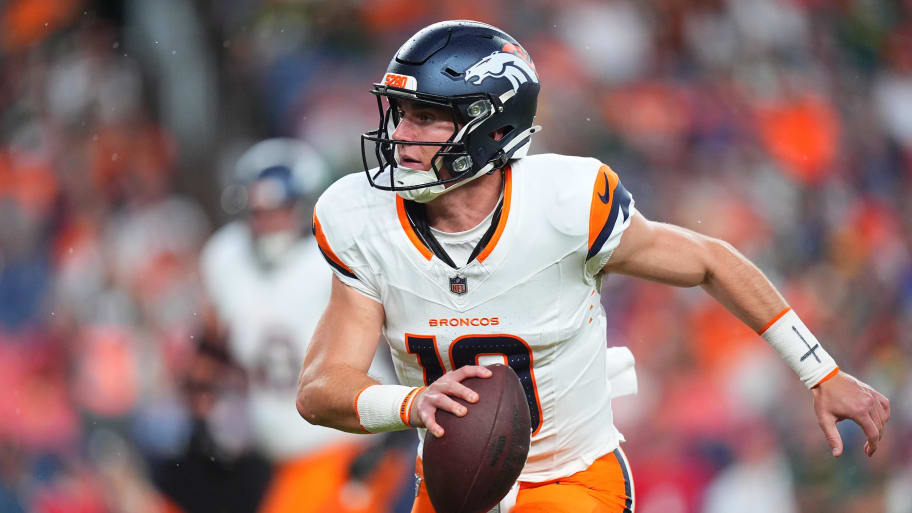
Bo Nix being named the starting quarterback for the Broncos is no surprise to anyone in Denver, including (and maybe especially) Sean Payton. We wrote earlier in the month that the second-year Broncos coach had Nix as one of the top two quarterbacks in the 2024 draft. And in the weeks since, Nix’s progress has continued to reinforce the Broncos’ belief in the No. 12 pick.
What you’ve gotten to see is a guy who, quite simply, has moved the Denver offense in every opportunity he’s had this preseason. He’s been in on seven possessions. One was short-circuited by a fumble, but the Broncos scored on the other six.
Away from the lights, he’s been just as good. Denver’s seen a guy with great pocket presence and escapability, accuracy in the intermediate areas and down the field, and he’s shown command of the Broncos’ offense. Given that he had 61 college starts, the expectation was that Denver was getting a guy who’d be ready to play right away. The Broncos, and Payton, saw more than that in him—they saw a guy whom they felt a lot of folks were missing on, maybe because those people couldn’t let go of Nix’s Auburn years.
Either way, it’ll be fascinating to see whether Payton, one of this generation’s best quarterback developers, is right on this one. Obviously, he and the Broncos have a lot riding on it.
Jahan Dotson is walking into about as good a situation as you could possibly draw up for a receiver in Philadelphia. He’ll have A.J. Brown and DeVonta Smith playing outside of him, and tight end Dallas Goedert on the inside. He has an experienced quarterback in Jalen Hurts and an experienced play-caller in Kellen Moore.
So will this be what lights a fire under him?
Dotson was among the guys who had friction with ex-Washington Commanders OC Eric Bieniemy last year and, as a result, didn’t play up to his talent. He’s a little skinny for the position (184 pounds), but has plenty of ability otherwise. And as for how he fit as a slot in Kliff Kingsbury’s new offense in Washington—Kingsbury made that position work for Larry Fitzgerald, Christian Kirk, Rondale Moore and Greg Dortch in Arizona, and those four are hardly all from one mold.
The Commanders started to receive inquiries as teams read about how Dotson wasn’t assured of a prominent role in the offense as camp wore on. Eventually, the Eagles offered something that was too good to pass up—a third-rounder and two sevenths, in exchange for a fifth-rounder along with Dotson.
But that it got to the point where head coach Dan Quinn and GM Adam Peters were willing to walk away from a former first-rounder at that position—with a rookie quarterback starting—should tell you what you need to know about where they were.
Sometimes a change of scenery helps, and Dotson is getting a very nice one. We’ll see what he does with it.
Contrasting the Atlanta Falcons and New England Patriots shows how hard it is to sit a first-round quarterback. Both teams very clearly went into training camp with plans to sit their top-10 picks at the position. In Atlanta, there hasn’t even been a question. In New England, the discussion carried into Sunday night’s preseason finale against the Commanders.
The reason? It’s what those two teams had elsewhere at quarterback.
The Falcons signed Kirk Cousins to a four-year, $180 million contract, including $100 million guaranteed, and got someone who has passed for 39,471 yards and 270 touchdowns in 12 years. You can criticize them for doubling down on the position after selecting Michael Penix Jr. at No. 8 in the draft. But no one, internally or externally, is questioning whether Penix should sit. The Patriots, meanwhile, got Jacoby Brissett at a fraction of the cost (one-year, $8 million deal), and the position is still open, even with Drake Maye needing development time.
Brissett’s a great guy, and a pretty good player, too. But selling him to a locker room that doesn’t care much about your three-year plan at quarterback (by the way, that’s all locker rooms—veteran players aren’t there to see you develop a guy at the most important position) might not be easy. Especially when Maye, the third pick in the draft, is starting to flash the ability that made him such a high pick in the first place.
But here’s the deal: Over the last 16 draft cycles, 48 quarterbacks have been selected in the first round. Among that group, there were only three real redshirts: Jake Locker in Tennessee in 2011, Patrick Mahomes in ’17 and Jordan Love in ’20. What all three had in common is they were behind accomplished starters—Matt Hasselbeck, Alex Smith and Aaron Rodgers—playing for contending teams.
Bottom line: To actually carry out a redshirt plan, a full generation of data tells us that you have to have those two elements in place. Atlanta does, and New England doesn’t. So the Patriots are going to have to be historically disciplined to give Maye he needs to succeed.
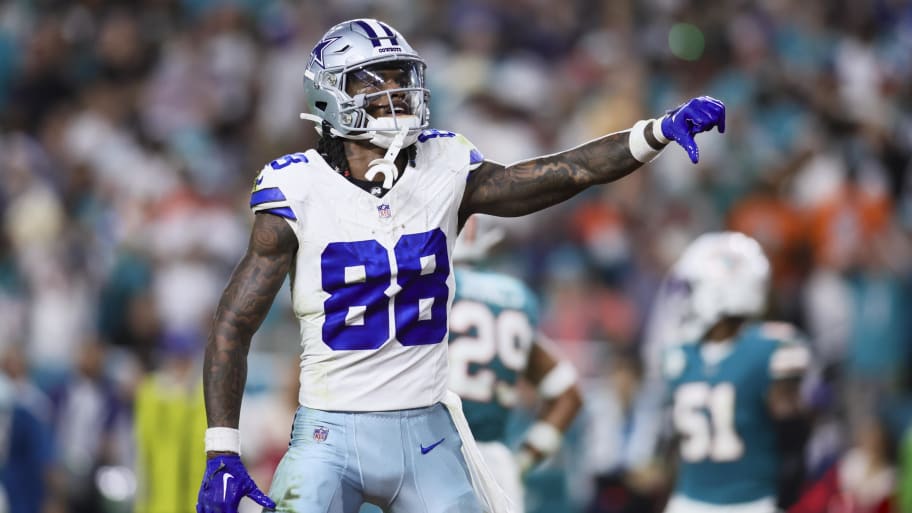
That the Dallas Cowboys are offering a $30 million-plus per year contract to CeeDee Lamb tells me a deal will happen. Dallas being in that neighborhood shows, to me, what the San Francisco 49ers’ initial offers to Brandon Aiyuk did—there’s not really an argument about how good the player is. It’s more about the market, which was thrown into flux when Minnesota Vikings receiver Justin Jefferson’s monster deal (four years, $140 million, $110 million guaranteed) got done.
Another good sign? Cowboys owner Jerry Jones, who’s rarely short on words, cutting off the Lamb topic altogether when reporters asked him about it after the Cowboys’ preseason finale.
“I don’t have any updates but we’re near the season starting,” Jones said. “Listen, we got a lot of things to talk about. I’m only talking about who’s here.”
That tells me progress has been made, and the boss isn’t about to screw that up—after a summer of speaking freely on the situation. It’d also follow Dallas’s pattern over the years of doing top-of-the-market deals with star players after long, drawn-out summer negotiations.
I bet it’ll be over soon, which could wind up, one way or the other, impacting whether Ja’Marr Chase gets a deal done with the Cincinnati Bengals before the season starts.
Creed Humphrey’s four-year, $72 million deal was groundbreaking for centers, and also instructive on where the Kansas City Chiefs are right now. With big deals for Patrick Mahomes, Chris Jones, Travis Kelce, Joe Thuney and Jawaan Taylor topping Kansas City’s salary cap, the team has needed to lean on rookie-contract players in a lot of different spots to make all the pieces fit together. That makes drafting well a necessity, and GM Brett Veach, assistant GM Mike Borgonzi and the team’s well-respected scouting staff has done just that.
But the bill is starting to come due.
Humphrey is one important piece from the 2021 draft class. Guard Trey Smith and linebacker Nick Bolton are two others. Then, in the ’22 class, you have Trent McDuffie, George Karlaftis, Leo Chanel, Isiah Pacheco and maybe even Bryan Cook as players who should be extension worthy when they become eligible next year.
It’s a champagne problem, for sure, What do we do with all the good players? But it’s a looming issue nonetheless that’ll impact Kansas City in the post-Kelce–Jones era as the Chiefs try to continue to build around their future Hall of Fame quarterback. And how they manage their cap could be a factor in how many rings Mahomes wins.
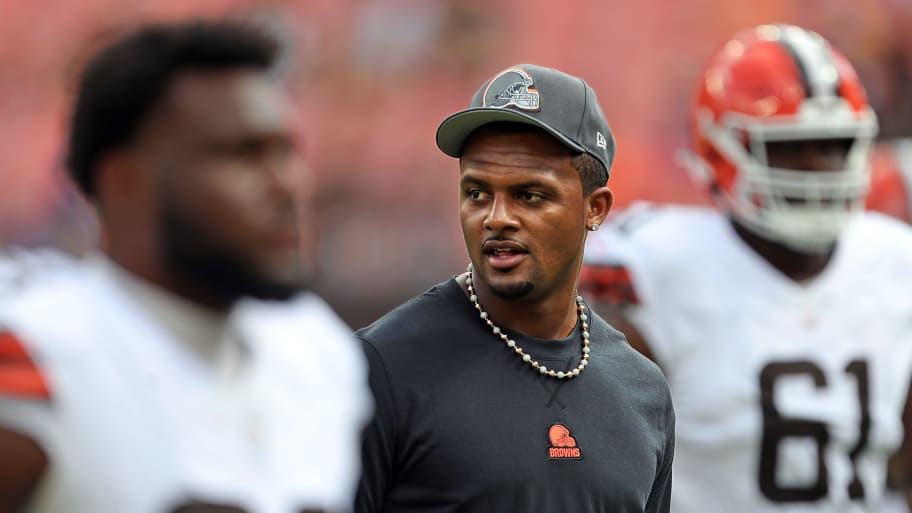
I think we’ll be able to see in September how Deshaun Watson’s doing with the Cleveland Browns. For his part, coach Kevin Stefanski has been pretty positive on where Watson is after a full summer’s work under his belt.
On his decision to sit Watson for the last preseason game, Stefanski told reporters he didn’t want to throw the quarterback out there with the number of offensive guys not playing. He then added that he’s “very confident in the amount of work he’s gotten to date throughout the spring and summer. And he’ll be ready to roll Week 1.”
As I see it, the Browns did a lot this offseason to try to make the scheme work for Watson, and Watson specifically. New OC Ken Dorsey’s background in the New England offense, which he learned from Brian Daboll and which Watson ran in Houston for Bill O’Brien, was a big factor in his hire. New line coach Andy Dickerson’s experience in quarterback-friendly Shanahan-style schemes is there, too.
In particular, the Browns really liked what Dorsey could do in the shotgun run game, the shotgun dropback game and with tempo, all elements that O’Brien used to leverage the best of Watson’s game from Clemson. Which is to say, the Browns are doing what they can now to give their quarterback a real comfort level and confidence in what he’s running.
That, at least on paper, should show up quickly.
We’re sending our best to the family of Baltimore Ravens offensive line coach Joe D’Alessandris, who died at age 70 on Sunday morning. The team announced early this month that D’Alessandris would be away for an extended period in dealing with an acute illness that arose as a complication from a surgery he underwent during the summer.
“Coach ‘Joe D.’ was a man of integrity and a man of faith. He made us all better," Ravens coach John Harbaugh said in a statement. “He was our reader at team mass, and he was loved by all here. He was a great coach and a good man—the kind of person who you are honored to have as a friend. He raised three incredible, beautiful daughters, and he was a most loving husband. His grandkids also adored him. I admired him, loved him and am going to miss him, because ‘Joe D.’ was a joy. Toni has him back now.
“May God bless ‘Joe D.’ forever.”
One thing that’s pretty obvious is how good he was at his job. This offseason, the Ravens let three 2023 starters go on the offensive line—right tackle Morgan Moses, and guards Kevin Zeitler and John Simpson. They let it happen, in large part, because of their confidence in their own ability to draft and develop linemen, and felt like they had guys such as Andrew Vorhees and Daniel Faalele ready to line up alongside homegrown mainstays Ronnie Stanley and Tyler Linderbaum.
That, of course, was because of their confidence in D’Alessandris, who by all of these accounts was as good of a guy as he was a coach.
Here’s hoping those close to him find some peace in his memory.
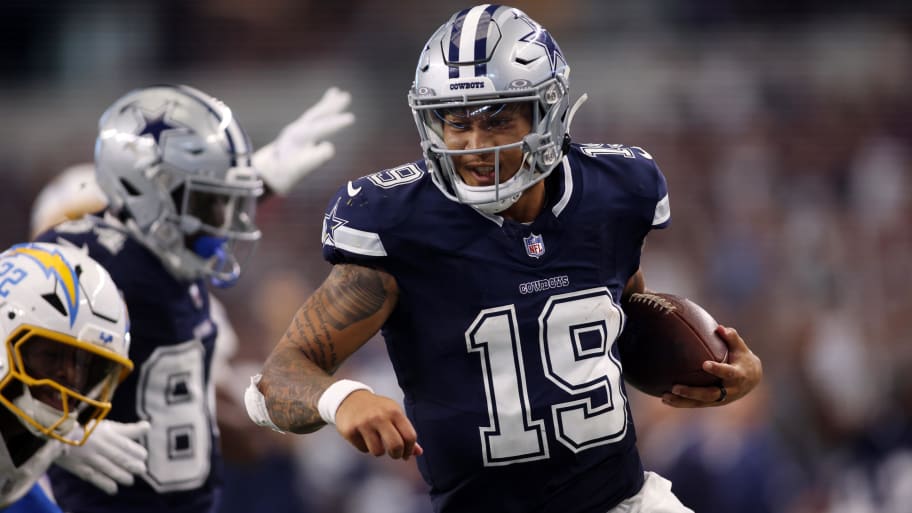
With camp complete, we have 10 quick-hitters ahead of Tuesday’s cuts. All of them are right here …
• I said it when I was at Seahawks camp a month ago, and I’ll say it again: Kenneth Walker III is going to have a very, very big year for the Seattle Seahawks.
• While we’re on running backs, I saw four rookies last week at the position whom I believe will be factors for their teams—Braelon Allen for the New York Jets, Tyrone Tracy Jr. (who spent most of college as a receiver) for the New York Giants, Bucky Irving in Tampa, and Jaylen Wright for the Miami Dolphins.
• It’s disappointing to hear Daron Bland will miss six-to-eight weeks with a fractured foot. Dallas was expecting a big encore from the All-Pro in 2024. Maybe they’ll still get it, but foot injuries can be tricky.
• Mike White was an interesting cut in Miami. It also shows how much they think of Skylar Thompson, who was just O.K. when he had to play as a 2022 rookie, but has been really good in the building and on the practice field since arriving in that April’s draft.
• The need for more offensive linemen (and a minor league to develop them) is obvious every summer, with teams fishing around for new ones right before the final cut. You can add corner and edge to that as positions a lot of teams will be looking for this week in trades based on my conversations over the past month. The problem is not many teams have a surplus at those spots.
• The sad thing about where Dallas backup quarterback Trey Lance is in his career lies in the fact that he simply needs reps, and to play through things like this weekend’s five-interception meltdown. But without a team invested in him the way the Niners once were, those will be tough to come by.
• Underrated but important guy: Vikings third receiver Jalen Nailor. He’s flashed the past two years, but he hasn’t been able to stay healthy. Now, with K.J. Osborn gone, and Justin Jefferson and Jordan Addison drawing coverage away, it looks like he has one heck of a shot to bring all that potential to the game field. If health permits, this time around.
• Darrell Taylor was out there and available for trade before the deadline last fall, and the Seahawks finally moved him this week, with the Chicago Bears, who struck out on Matthew Judon, bringing him in as a complement to Montez Sweat on their front. The hope is he’ll be a better fit for Matt Eberflus’s aggressive 4–3 scheme than he was in Seattle’s new 3–4.
• My buddy Rich Eisen always has a way of getting things out of me. Here’s a good example, where we talked about Tua Tagovailoa and got around to talking about quarterback development in general—and what this generation’s signal-callers sometimes need.
• And, finally, our old friend Peter King needs your help, and I can’t think of many better causes than to help kids get involved in sports. Go here, give if you can, and read about the good work P.K. is doing.
This article was originally published on www.si.com as NFL Training Camp Takeaways: Why the Steelers Could Start Justin Fields.







